|
|
|
Sort Order |
|
|
|
Items / Page
|
|
|
|
|
|
|
| Srl | Item |
| 1 |
ID:
120207
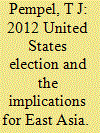

|
|
|
|
|
| Publication |
2013.
|
| Summary/Abstract |
The 2012 election resulted in a major victory for President Obama and while his Democratic Party improved its Congressional strength, the House of Representatives remains under Republican control. The election revealed the depth of America's political and voter divisions with each party showing dramatically different areas of strength and weakness. Yet the election did not hinge on foreign policy leaving the Obama administration likely to continue most of its earlier policies toward East Asia as marked by the multilayered 'pivot' toward Asia. Relations with China and North Korea are likely to remain difficult to manage while US-ROK links should be far smoother. Of particular concern is the economic sluggishness and rising nationalism in Japan which could well cause bilateral problems with the US and regional problems with Japan's neighbors, including US ally, South Korea. And at home the bipolar divisions over how best to deal with America's economic revitalization could well impede US abilities to exert a convincing multi-dimensional role in the region.
|
|
|
|
|
|
|
|
|
|
|
|
|
|
|
|
| 2 |
ID:
120209
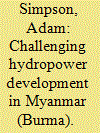

|
|
|
|
|
| Publication |
2013.
|
| Summary/Abstract |
Although general elections in Myanmar (Burma) in November 2010 have transformed the political landscape, many of the characters remain the same. While there is evidence of incremental domestic political openings many of the political constraints that existed during military rule remain in force. As a consequence of decades of military authoritarian governance and civil conflict, it is Myanmar's contested ethnic borderlands that have been the important locales for the development of environmental movements, despite increased recent domestic activity. This article analyses a case study of the largely cross-border campaign against hydropower dams on the Salween River in Myanmar and finds that through the suppression of opposition and dissent at home the regime has stimulated the creation of an 'activist diaspora', a dynamic transnational community of expatriates who engage in environmental activism beyond the reach of the regime. Due to their relative freedom on the border and in Thailand this community has developed expertise and international networks that have proved crucial in communicating the social and environmental impacts of hydropower development in Myanmar to the international community. Through increased cooperation with an expanding domestic civil society this established activist community is stimulating improved environmental governance of hydropower development and simultaneously assisting in the creation of a more open and democratic Myanmar.
|
|
|
|
|
|
|
|
|
|
|
|
|
|
|
|
| 3 |
ID:
120211
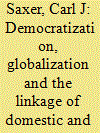

|
|
|
|
|
| Publication |
2013.
|
| Summary/Abstract |
This article examines the increased linkage between domestic and foreign policy that has been a consequence of democratization and globalization in Korea. It argues that while prior to 1987 foreign policy-making saw very little public input, and while democratization did not lead to a weakening of domestic political institutions nor a rise in nationalism, it did open up domestic political space where foreign policy-making increasingly became part of the contentious electoral competition. The globalization policy, initiated with the purpose of raising Korea's international status, which has remained a goal of succeeding administrations, created a complex interdependency which led to a breakdown in the separation between the domestic and international, and that often brought with it a domestic backlash. As a consequence foreign policy-making, in the absence of a tradition of political compromise, increasingly runs the risk of either inconsistency, or even deadlock.
|
|
|
|
|
|
|
|
|
|
|
|
|
|
|
|
| 4 |
ID:
120210
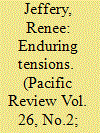

|
|
|
|
|
| Publication |
2013.
|
| Summary/Abstract |
From 1998 to 2003, the Solomon Islands found itself in the grip of 'the Tensions', a violent civil conflict that left some 200 people dead, more than 20,000 displaced, and countless others subjected to torture, rape, fear and intimidation. In the aftermath of the conflict, two dominant approaches to post-conflict justice emerged. The first, implemented by the Regional Assistance Mission to the Solomon Islands (RAMSI), favoured a 'rule of law' approach according to which large numbers of militants on both sides were arrested and processed through the criminal justice system resulting, in many cases, in the imposition of lengthy period of imprisonment. The second, 'reconciliation' approach, favoured local, grassroots, traditional and indigenous justice processes and were routinely implements by community groups, women's organisations and the churches. This article demonstrates that in the absence of a formally planned transitional justice process, these two approaches to post-conflict justice have come into serious tension with proponents of each accusing the other of hampering their justice efforts. It examines those tensions and analyses the extent to which the Solomon Islands' Truth and Reconciliation Commission, designed in part to provide a bridge between the rule of law and reconciliation approaches, has been able to quell this new set of tensions.
|
|
|
|
|
|
|
|
|
|
|
|
|
|
|
|
| 5 |
ID:
120212
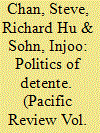

|
|
|
|
|
| Publication |
2013.
|
| Summary/Abstract |
Why have relations across the Taiwan Strait and the 38th parallel on the Korean Peninsula undergone different processes of détente and reversal? We apply the perspective of two-level games to understand the divergent experiences of these two cases of contested sovereignty and regime rivalry. In particular, we call attention to the alignment and misalignment of domestic and international of interests and influences in our analysis, and the dampening and exacerbation of escalating recriminations in comparing these divergent experiences. Three phenomena are especially noteworthy. First, a third party, the US, is critical as a principal agenda setter. Washington's policies are important in abetting or hampering Seoul' and Taipei's domestic politics concerning policies toward their respective rivals. Second, Washington's policies are also important in influencing Beijing' and Pyongyang's policies, which in turn shape and even force responses from Seoul and Taipei. Therefore, policies tend to reverberate not just between domestic and foreign levels, but also across multiple borders in fostering cascades and echoes. Third, the extent to which political rapprochement is accompanied by economic integration is relevant. Extensive economic ties can serve as a brake to tension escalation, and produce resources and incentives that affect politicians' domestic competition and to alter their constituents' perceptions of the potential costs and benefits of pursuing détente and cooperation.
|
|
|
|
|
|
|
|
|
|
|
|
|
|
|
|
|
|
|
|
|